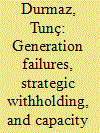| Srl | Item |
| 1 |
ID:
192714


|
|
|
|
|
| Summary/Abstract |
Since the deregulation of significant parts of electricity markets in many countries worldwide, a generally pronounced matter is that firms strategically lower their generating capacity to raise electricity prices. This paper investigates whether strategic capacity withholding exists in the form of generation failures in the Turkish day-ahead market and whether the capacity remuneration mechanism contributes to the failure durations. The empirical results show strong support for strategic capacity withholding in the Turkish market, and the capacity mechanism adds to the duration of these failures. To the best of our knowledge, this is the first study to investigate capacity withholding considering centrally determined capacity prices and to focus on failure durations and the potential amount of power generation losses they cause. Our analysis conveys core messages for policymakers. A random verification mechanism may be implemented to verify that the failures are purely technical and apply penalties for nonperformance. Second, the Turkish capacity mechanism needs to be restructured to make it more compatible with performance incentives. Our analysis, while focused on the Turkish market, provides insights into the prevalent challenges and potential solutions tied to strategic capacity withholding in deregulated electricity markets globally, notably those employing capacity remuneration mechanisms.
|
|
|
|
|
|
|
|
|
|
|
|
|
|
|
|
| 2 |
ID:
125561


|
|
|
|
|
| Publication |
2013.
|
| Summary/Abstract |
This paper deals with the practical problems related to long-term security of supply in electricity markets in the presence of large-scale wind power development. The success of recent renewable promotion schemes adds a new dimension to ensuring long-term security of supply: it necessitates designing second-best policies to prevent large-scale wind power development from distorting long-run equilibrium prices and investments in conventional generation and in particular in peaking units. We rely upon a long-term simulation model which simulates electricity market players' investment decisions in a market regime and incorporates large-scale wind power development in the presence of either subsidized or market driven development scenarios. We test the use of capacity mechanisms to compensate for long-term effects of large-scale wind power development on prices and reliability of supply. The first finding is that capacity mechanisms can help to reduce the social cost of large scale wind power development in terms of decrease of loss of load probability. The second finding is that, in a market-based wind power deployment without subsidy, wind generators are penalised for insufficient contribution to the long term system's reliability.
|
|
|
|
|
|
|
|
|
|
|
|
|
|
|
|
| 3 |
ID:
191336


|
|
|
|
|
| Summary/Abstract |
Energy support schemes can either facilitate or restrict the sustainable development of the energy sector. This article reviews the interface and interaction between two types of energy support schemes – renewable energy support schemes and capacity mechanisms – in the European context. It first explains how state aid in the form of these two energy support schemes is regulated in the European Union and, second, shows how this regulation is reflected in national practices of the Member States by exploring the approaches to renewable energy in various capacity mechanisms. This interdisciplinary analysis of the trade-offs and synergies between renewable energy policies and energy security policies in Europe finds that the European experiences are diverse. The article demonstrates how states often operate a conflicting policy mix where renewable energy support facilitates decarbonization while, in many cases, capacity mechanisms simply back up the intermittency of renewable energy sources with fossil-fuel-based energy solutions that hinder the achievement of the energy transition. Facilitating a shift of focus in capacity mechanisms to low-carbon technologies, demand-response, and storage solutions is the first step in resolving the conflicting policy mix.
|
|
|
|
|
|
|
|
|
|
|
|
|
|
|
|
| 4 |
ID:
150731


|
|
|
|
|
| Summary/Abstract |
Russian renewable energy policy, introduced in May 2013, is a capacity mechanism-based approach to support wind, solar, and small hydro power development in Russia. This paper explores the effect of the new mechanism on the profitability of new renewable energy investments with a numerical example. The sensitivity of project profitability to selected factors is studied and the results are compared ceteris paribus to results from a generic feed-in premium case. Furthermore, the paper gives a complete and detailed presentation of the capacity price calculation procedure tied to the support mechanism.
The results show that the new Russian renewable energy capacity mechanism offers a significant risk reduction to the investor in the form of dampening the sensitivity to external market factors. At the same time it shields the energy market system from excessive burden of renewable energy support. Even if the complexity of the method is a clear drawback to the detailed understanding of how the mechanism works, the design of the incentive policy could be an appealing alternative also for other emerging economies.
|
|
|
|
|
|
|
|
|
|
|
|
|
|
|
|